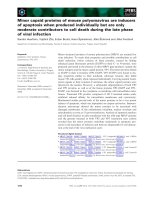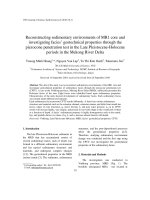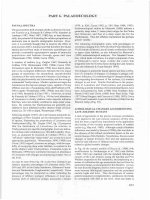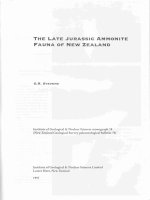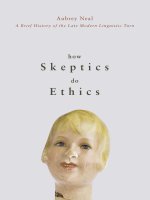The late tenant
Bạn đang xem bản rút gọn của tài liệu. Xem và tải ngay bản đầy đủ của tài liệu tại đây (906.27 KB, 202 trang )
TheProjectGutenbergeBook,TheLateTenant,byLouisTracy
ThiseBookisfortheuseofanyoneanywhereatnocostandwith
almostnorestrictionswhatsoever.Youmaycopyit,giveitawayor
re-useitunderthetermsoftheProjectGutenbergLicenseincluded
withthiseBookoronlineatwww.gutenberg.org
Title:TheLateTenant
Author:LouisTracy
ReleaseDate:March26,2011[eBook#35691]
Language:English
Charactersetencoding:ISO-8859-1
***START OF THE PROJECT GUTENBERG EBOOK THE LATE
TENANT***
E-textpreparedbyDAlexander
andtheOnlineDistributedProofreadingTeam
()
frompageimagesgenerouslymadeavailableby
InternetArchive
()
Note: ImagesoftheoriginalpagesareavailablethroughInternetArchive.See
/>
THE
LATETENANT
BY
GORDONHOLMES
AUTHOROF“AMYSTERIOUSDISAPPEARANCE,”
“THEARNCLIFFEPUZZLE.”
NewYork
EdwardJ.Clode
156FifthAvenue
1906
COPYRIGHT,1906,BY
EDWARDJ.CLODE
EnteredatStationersHall
ThePlimptonPressNorwoodMass.U.S.A.
CONTENTS
CHAPTERI
AWHIFFOFVIOLETS
CHAPTERII
ASIGNATUREWITHAFLOURISH
CHAPTERIII
VIOLET
CHAPTERIV
“JOHANNSTRAUSS”
CHAPTERV
VONORVAN?
CHAPTERVI
THEWORDOFJOY
CHAPTERVII
VIOLET’SCONDITIONS
CHAPTERVIII
ATDEADOFNIGHT
CHAPTERIX
COMINGNEAR
CHAPTERX
THEMARRIAGE-LINES
CHAPTERXI
SWORDSDRAWN
CHAPTERXII
THENIGHT-WATCHES
CHAPTERXIII
NOMOREVIOLET
CHAPTERXIV
THEDIARY
PAGE
1
15
27
36
45
60
70
83
96
106
117
133
144
163
CHAPTERXV
INPAIN
173
CHAPTERXVI
HANDTOHAND
CHAPTERXVII
DAVIDMORETHANREGAINSLOSTGROUND
CHAPTERXVIII
FROMTHEDEPTHS
CHAPTERXIX
VIOLETDECIDES
CHAPTERXX
DAVIDHASONEVISITOR,ANDEXPECTS
OTHERS
CHAPTERXXI
THEMIDNIGHTGATHERING
CHAPTERXXII
VANHUPFELDTMAKESAMENDS
180
197
213
227
242
257
271
TheLateTenant
CHAPTERI
AWHIFFOFVIOLETS
“I suppose one becomes used to this sort of thing in time,” thought David
Harcourt,ashepeeredthroughthedustyplate-glasswindowsofhisthird-floor
flat.“AtpresentIcanappreciatethefeelingsofaWyomingsteerwhenhefirst
experiencestherestraintofacattle-truck.OramIacagedbird?oramenagerie
ape? or a mere ass? There is something in the evolution theory, after all.
Obviously,oneofmyrespectedancestorsiskicking.”
Then, being a cheerful soul, he laughed, and turned from the outer prospect to
face the coziness of his new abode. He did not understand yet that in No. 7,
Eddystone Mansions, picked almost at haphazard from a house-agent’s list, he
hadhituponaresidencesingularlyfreefromthesortofthingwhichinducedthis
present fit of the blues. In the first place, owing to a suit in chancery, the
“eligible”building-siteoppositewasvacant,andmostofthewindowsofNo.7
commandedanopenspace.Secondly,thestreetitselfdidnotconnecttwomain
thoroughfares; hence its quietude was seldom disturbed by vehicles. Thirdly,
and, perhaps, most important of all, his neighbors, above, below, and on three
sides,werepeoplewhohadachievedbydesignwhathehaddonebyaccident—
they had taken up their abode in Eddystone Mansions on account of the peace
thussecuredintheheartofLondon.
ForLondonhasastonyheartwithwoodenarteries,throughwhichthestreamof
liferushesnoisily.Toearstunedbythefar-flungsilenceoftheprairiethisdinof
trafficwasthunderous.Toeyestrainedbythesmoothhorizonitwasbewildering
to see a clear sky overhead and a sun sinking slowly, like a dim Chinese fireballoon,intoacompoundofsmokeandchimneys.Infact,DavidHarcourtcame
to the conclusion that Londoners, as a race, must be purblind and somewhat
deaf.
“IwonderifIcanstandit?”hecommented.“IsawamapofSouthAfricaina
shop window to-day. It looked wonderfully attractive. Yes, I am beginning to
believethereisneitherclawnorfeatherinmycomposition.‘Kicking’istheright
word—hoof—ass! Oh! the line of descent is clear.” Then he laughed again,
taking a box of cigars off the top of a bookcase, and any one who heard him
laugh would have grasped the reason why men soon called him “Davie,” and
womensmiledwhenhelookedatthem.
Dame Nature, aided by his less remote ancestors in the evolutionary tree, had
beengoodtohim.Itwouldhaveneededtheworst“environment”everdreamed
ofbysociologytomakehimadegenerate.Asitwas,ahealthyupbringing,afair
public-schooleducation,andthechancethatarelationofhisownedaWyoming
ranch, joined in fashioning an excellent specimen of lusty and clean-souled
young manhood. But that same general wet-nurse, who had intended David to
lord it over herds and vast pastures, had complicated matters by throwing a
literarykinkintothedeftlycoiledstrandsofhiscomposition.Thus,attheageof
twenty-five,hetook moreinterestinscribblingstoriesand searching forrimes
thanintotinguptheproceedsofsalesatChicagostock-yards.Worsethanthat,
havingoftimaginedandstriventodepictvariousetherealcreaturestypicalofthe
Spirit of the Dawn, the Fairy of the Dell, or the Goddess of the Mist, he had
refused,mostemphatically,towedtheelderlyrancher’sdaughter,hisrelative,a
lady blessed with more wealth and weight than was necessary for any one
womanintheworld.
So,likemanyanotheryoungsterinthefarlands,heheardthevoiceofLondon
callingthrougheverybookandnewspaperheread.Itwasasirenvoice,devoid
ofaccent.TheWyomingwooing,too,becameaseriousmatter;hence,likeone
ofthedove-eyedoxenheknewsowell,hestampededinsuddenpanic,realized
his personal possessions, and, in the vernacular of Sioux Pass, “lit out for the
nearestdepot,an’boardedaneast-boundtrain.”
He had now been in England a month, in London a week. From the landingstage at Liverpool he had gone to visit the country cousins who superintended
hischildhoodandeducationafterthedeathofhismother,thatladyhavingbeen
strickendownbythehandwhichkilledhersoldierhusbandatDargai.Hefound
the cousins snug in their Bedfordshire nest. The squire-like head of the
householdwondereddullywhyanymanshouldquitaplacewherehecould“get
on” to seek a precarious livelihood in a land which was “rapidly going to the
dogs.”Davidcertainlyreceivedmoreencouragementfromtheyoungermembers
of the family, especially from a bright-eyed maiden of eighteen, who thought
London“awfullyjolly,” andvowed aliterary careertobe“quitetoodevey for
anything.”
But David was level-headed enough to see that the verdict of squire and maid
wereequallyunfavorable.
Thenfollowedafewdaysinabighotel.Hepaidaroundofuselesscallsatthe
officesofmagazinesthat,tohiscertainknowledge,printedallsortsofrubbishy
articlesaboutcow-boylife,butopposedaphalanxofcommissionairesagainsta
manwhocouldnotonlyroundupaninfuriatedherd,butcouldalsodescribethe
featdeftlywithapen.Ultimately,heresolvedtolaysiegetothecitadelwhichhe
wasunabletostorm,andpitchhiscampoveragainstthetentsoftheenemy.He
tookafurnishedflat,“withplateandlinen,gas-stove,electriclight,bathH.and
C.,”forsixmonths.
In thus becoming a Londoner, he encountered the first quaint anomaly of
Londonlife.Whenhedroveuptothedoorofthemostfashionablehotelinthe
WestEnd,anddepositedacoupleofportmanteausinabed-roomaftersigning
the register, he was permitted to run a bill for a week, at least, without let or
hindrance;butwhenheofferedtopaycashinadvancefortheflat,hemetwitha
demandfor“references.”
Theagentwasfirmbutexplanatory.“Itisnotmyclient,buttheover-landlord,
whomakesthatstipulation,”hesaid.“Infact,thelettingiswhollyinmyhands,
asthelatetenantisdead;but,forcertainreasons,theresiduarylegateeswishto
keeptheplaceinitspresentconditionuntiltheleaseexpiresayearhence.”
“Didthelatetenantdiethere?”askedDavid.
“Well—yes—fully five months since; there have been other occupants
subsequently,andthetermsaresoreasonable—”
“What did he, or she, die of?” persisted David. He was accustomed to reading
men’sfaces,andhehadcaughtacertainflutteringoftheagent’seyelids.
“Nothingtocauseanyalarm,nothinginfectious,Iassureyou.People—er—die
in flats just the same as—er—in private houses.” This, being a joke, had its
chuckle.
But the agent also knew men in his own way, and he felt it was unwise to
wriggle. David had a steadfast glance. He gave others the impression that he
heardandtreasuredeachwordtheyuttered.Hewasreallywonderingthenwhy
the speaker’s neck was so long and thin—nothing more serious, but, with a
disagreeabledisclosurelurkingintheother’smind,David’sscrutinycompelled
candor.
“Thethingisboundtocometoyourearssoonerorlater,Mr.Harcourt;soImay
aswelltellyounow,”saidtheLondoner.“Thelatetenantwasalady,asingerof
muchpromise,itwassaid.Foranunknownreason—probablysomeloveaffair
wasdisturbingherrest—she—er—tookanoverdoseofasleeping-draft.Shewas
a very charming woman, quite young, of highest character. It is inconceivable
that she should have committed suicide. The affair was an accident, of course,
but—er—”
“Ascepticalcoronerthoughtitamurder?”
“Oh, dear, no, nothing of the kind, not a hint of such a thing. Fact is—well, it
soundsridiculoustosaywithreferencetoapopularblockofflatsinthemiddle
of London,buttwofoolish women—anexcitableactressandherservant,your
predecessorsintheflat—havespreadreportsastoqueernoises.Well,youknow,
don’tyou?thesortofnonsensewomenwilltalk.”
“InplainEnglish,theysaytheplaceishaunted.”
“Ha, ha! Something in that nature. You have hit it! Something in that nature.
Absurdthing!”
“Whoknows?”Davidhadacolddisbeliefinspooks,butitamusedhimtosee
theagentsquirm;andhesattight.Thoseeyelidsflutteredagain,andMr.Dibbin
bangedaledgerwithwrathfulfist.
“Lookhere,Mr.Harcourt,”criedhefinally.“Thisisafive-guineas-a-weekflat.
I’llmakeyouafairoffer;takeitforsixmonthsandIgiveityouathalfprice.”
“Ilayingtheghostattwoandahalfguineasweekly?”
“Putitanywayyoulike.Ifamanofsoundcommon-senselikeyoulivesthere
foraconsiderableperiod,thewretchedaffairwillbeforgotten;soitisworththe
losstome,anditisafirst-classbargainforyou.”
“Done!”saidDavid.
Theagentwassopleasedthathisannoyancevanished;hepromisedtosecurea
woman whom he knew to look after the new tenant’s housekeeping. She had
probablyneverheardoftheEddystoneMansionstragedy.Hewouldhaveherin
the flat within four days. Meanwhile a charwoman might attend to things
generally.
The references having proved satisfactory, David was now passing his first
evening in his new abode. He had purchased some books and stationery; his
charwoman had left him; and, when the door had closed behind her, he turned
fromtheheadofthedeadgirlinchalksoverthemantelpiecetogazeoutofthe
dining-room window, and back again to the sweet face in chalks, to return
presentlytothewindow.
ItwasaThursdayeveninginthelastweekofJanuary.Thehousekeeperwasto
arrive on Saturday. David fixed Monday as a good day to start work. In the
interimhemeanttoloaf,dineatnoteworthyrestaurants,read,andgototheaters.
Amanaccustomedtoguidehismovementsbythepositionofmountain-ranges
or the stars, and count distances by his days on horseback, is likely to find
himselfallunhingedwithinafour-mileradius.Davidwasinthenovicestageof
acquaintanceship with the magnetic life of the world’s capital. Not yet did the
roar of London sing in familiar harmonies; the crunch of the omnibuses, the
jingleofthehansoms,madenomusicinhisears.Therewassomethinguncanny
in the silence of the millions eddying through the streets. Where all else was
clamor,mankindwasdumb,savefortheshoutsofthenewsboys,thejabberof
bus-conductors,thecriesofitinerantvenders.
So David, having dressed and gone out, wandered into another restaurant than
that which he was aiming for; dawdled over the meal until the first act of the
play which he meant to see must have been ended; and decided then upon a
music-hall; finally, he strolled back toward Eddystone Mansions as early as
eleven.
Theelevator,placedinthecenterofthebuilding,ranfromthebasementfloor;
those who used it had to descend a few steps from the entrance and advance
along a passage. Harcourt felt unaccountably tired—there is a strain of life in
London as on the tops of mountains—so he chose the lift in preference to the
stairs.
The hall-porter, who sat within the lift, pondering the entries for the Spring
Handicaps,recognizedhim,andjumpedupwithasalute.
“Good-evenin’, sir! Fine, frosty night, sir,” said he. They began to ascend. A
thoughtoccurredtoDavid.“WhatwasthenameoftheladywhooccupiedNo.
7?”heasked.
“MissErmynL’Estrange,sir,”wastheinstantanswer.
EveninthewildsofWyomingonegraspsthesignificanceofcertainclassesof
names. For instance, not even the rawest tenderfoot would expect “One-eyed
Pete”toturnouttobeaparson.
“Imeantheladywhodiedhere,”saidDavid.
Theporterstoppedthelift.“Yourfloor,sir,”hesaid.“I’veonlybininthese’ere
flatsamattero’twomonths,sir.”
“Goodegg!”criedDavid.“Haveacigar,porter.Youareamantobedepended
on.Butsurelythereisnoharmintellingmethepoorgirl’sname.Itmusthave
appearedinallthenewspapers.”
The attendant tickled his head underneath his hat. The new tenant of No. 7
seemedanicegentleman,anyhow.Helookedupanddownthestairs,ofwhich
twosectionswerevisiblefromthelandingwheretheystood.
“I’ave’eard,”saidhe,“thatayounglydyusedterlive’ereofthenymeofMiss
GwendolineBarnes.”
“Ah,thatsoundsmorelikeit.Good-night.”
“Good-night,sir.”
Harcourt,fumblingovertheintricaciesofthelock,heardtherattleoftheliftasit
reachedthebasement.Onhislandingweretwodoors,hisownandthatofNo.8;
and light shone from his neighbor’s dwelling. That was companionable. The
stairs,too,werewelllighted.
At last he gave the key the right pressure, and the latch yielded. He passed
within and closed the door noiselessly. The electric switch governing the halllamp was on the wall beyond the short entrance-passage. He removed his
overcoatandhatinthesemi-darkness;thesheencomingthroughthecorrugatedglasspanelsoftheouterdoordidnotsomuchascastashadow.
All at once he detected a fragrance of violets, faintly, but distinctly. This was
puzzling!Heknewthatitwasalmostimpossibleforthatscenttohavebeenthere
earlierintheeveningwhenhewasathome,withoutbeingmarkedbyhim.Even
now not one man in a thousand in London that night would have caught the
subtleperfume;butDavidretainedthehunter’ssenses.Ashestoodinsuspense,
a feeling peeped and grew up within him that the odor carried with it a
suggestion of death; his muscles grew taut, ready to fight, to defend himself
againstthisworldorthenext.
Thenextinstanthesmiled,thinking:“Nonsense!Itmusthavebeenherebefore.
EachtimeIcameinIwassmoking;theairisfrosty,too.”
He groped inward for the switch, turned on the light, and, without deigning to
give another thought to the smell of violets, turned to the left along the main
corridor,whichwasrectangulartotheentrance-hall.Passingthedrawing-room
door, he entered the dining-room. Opposite the latter was the kitchen and
servants’apartments.Aroundtheotherendofthemaincorridorweredisposed
three bed-rooms and a bath-room. The light he had turned on illuminated
entranceandcorridoralike.
In the dining-room he found the fire still burning. That was good. The coalscuttle was not by the fireplace, but in a corner. He went to get a shovelful of
coal;andashestooped,againcametohimthefragrance,thrilling,bringingwith
itapictureofagirlwhomhehadonceseenlyinginfunerealstate,surrounded
byflowers,andclothedinthelastwhiterobesofearth.
David stabbed the coals with the shovel. “What’s wrong with me?” he half
laughed.YethiseyessoughtthecrayondrawingofGwendolineBarnes.
Presentlyhelitacigar,unfoldedaneveningpaperwhichhehadboughtinthe
streets,andtriedtotakeaninterestinthenewsofthisnew-oldworldintowhich
hewasnew-born.
Buthismindwandered.Withoutheheardthedistantrumbleoftraffic;hansoms
werebeginningtoarriveinthestreetbeneath;hehearddoorsslam;thejingling
of bells on head-stalls; feet pattering across the pavement; a driver’s tongueclick,andawaywouldjogahorse,tobestirred,perhaps,intosuddenfrenzyby
twoshrillsofafar-offwhistle.
A contrast, these sounds, to the twig-snapping and grass-rustling of a night on
the plains! There, lying by the camp-fire embers, he had heard the coyote
slinkingpastinthedark,whilethetetheredhorsessuspendedtheircroppingto
hearken.Heremenandstreetsmadeayetstrangerwilderness.Hesatoverthe
hearth absorbed by it, already yielding his tribute to the greatness of the outer
oceanoflife.
Butprairieorcity,manmustsleep.Davidroseandwenttothesideboardfora
decanter. A certain graceful slowness characterized his movements. Town-bred
men might have been deceived thereby, might reason that he was lethargic, of
strappingphysique,certainly,yetamanwhocouldbehitthreetimesbeforehe
counteredonce.Itisthiserrorofjudgmentwhichleadstoaccidentswhentowndwellersencounterthedenizensofthejungle.Harcourt’shandwasoutstretched
for the decanter when he became aware that he was not alone in the flat. The
knowledgewasderivedfromneithersightnorsound.Itwasintuitive,aspecies
offeelingthroughspace,animperativeconsciousnessthathesharedhissuiteof
apartmentswithanotherdistinct,ifintangible,being.Manymenmightnothave
hadit,butHarcourthaditclearly.
Instantly he was rigid. This time he was weaving no fantasy round a whiff of
violets. The sense of nearness to other presences is really inherent in man.
Residenceinsettledcommunitiesdullsit,butinDavidHarcourtitwasaliving
faculty.Hestoodmotionless,waitingforsomesimpleproofofhisbelief.
Thedoor,veiledbyaportière,wasnotclosed,butsufficientlyclosedtoprevent
anyviewofthecorridor,which,otherwise,itcommandedthroughout.Theflat
was carpeted so thickly that movement was silenced. But David fancied that a
woman’sdressdidbrushsomewhereagainstwallorfloor.Thatwasenough.He
was about to spring forward and pull the door open to see, when he heard, or
thought that he heard, the switch of the light outside click, as if it had been
carefullyraised.Andontheinstant,withouthesitation,hepusheduptheswitch
in the dining-room, and hid himself in darkness. There are wolves, too, in the
Londondesert.
Now,likeabush-cat,hecrepttothedoor,openedit,andpeepedout.Certainly
the light which he had left burning had been extinguished by some hand; the
corridorwasindarkness.
Nerves,ascommonlyunderstood,didnotmuchenterintoHarcourt’sschemeof
things. But his heart beat quicker. The speed of thought cannot be measured.
Manyquestions,andonedoubt,onequestion,flittedthroughhisbrain.Hestood
in deep gloom; near him, he was convinced, was something in the guise of
woman. The face in chalks on the mantelpiece seemed to crowd the dark, the
face of the woman who had been hovering on the verge of his consciousness
eversincetheagenthadmentionedhertohim.
CHAPTERII
ASIGNATUREWITHAFLOURISH
He was collected enough, though the blood was rather cool in his veins, and
therewasanoddsensitivenessattherootsofhishair.“Whoisthere?”heasked
inamatter-of-factvoice.
Therewasnoanswer,andnowhehadafeelingthatthepresencewasdrawing
nearer.
He was unarmed, of course. The inseparable six-shooter of the West lay at the
bottom of a cabin-trunk in his bed-room. But his faculties were exerted to an
extent hardly possible to men who have not lived close to wild nature. He
conceived that his safety demanded the exercise not only of pluck, but of
artifice. So he stepped softly to the corner by the entrance to the servants’
apartments, and, standing there, sought a loose match in his waistcoat pocket,
and held it against the wall, ready to light it at an instant’s notice. He did not
meantosacrificetoanychivalricnonsenseaboutsextheopeningmoveinwhat
might prove to be a game of life or death. The woman, or whatever it was,
showed by her conduct that she was not there by some mischance capable of
explanation; he would determine by her first move, by the first flash of light,
howtodealwithher;and,iftherewereotherswithher,herbodywouldbehis
shield until he gained the outer door and staircase. And so he waited, with the
alertpatienceofanIndian,poisedontheverytip-toeofaction.
But as time passed, and there was no further sign of life in the corridor, the
situation became over trying. He formulated a fresh plan. Behind him lay the
kitchen, with its fire-irons, and thither he ran, seized a poker, then rushing out
again, had the corridor, the drawing-room, every room, alight. But he saw no
one.
He searched each room with eager haste, but there was nothing out of the
common to be discovered. The front door was closed as he had left it. He ran
intotheexteriorlobby,and,keepinganeyeontheexit,summonedtheelevator.
Upitcame;buttheporter,throwingopenthedoors,checkedhisreadysalutein
hisalarmatthesightof“No.7”facinghimpokerinhand.
“Haveyouseenaladygoout?”demandedDavid.
Themandrewback,onehandonhisleverandtheotheronaslidingtrellis-work
ofiron.
“N-no,sir,”hestammered.
“Don’tbefrightened,”saidDavid,sharply.“Iwantyoutokeepyourwits.Some
onehasbeeninmyflat—”
“Isthatso,sir?”
“Wherehaveyoubeenduringthelastfiveminutes?”
“Down-stairs,sir.”
“Atthedoor?”
“No,sir,intheback,notfiveyardsfromthelift,sir.”Hethoughtitunnecessary
tomentionthathehadbeentalkingtothehousemaidofNo.2,inthebasement
onherwaytothepost.
“Soanyonecouldhavegoneoutwithoutyourknowledge?”
“Iftheywentbythestairs,sir.”
“Comeinandhelpmetosearchmyplaceagain.”
Theporterhungback.Theman’ssheepishfacewasalmostcomical.
“Come,come,”saidDavid,“thereisn’tmuchtobeafraidofnow,butItellyou
thatsomeoneputoutthelightinthecorridor,andIamalmostsurethatIheard
thestirofawoman’sdresssomewhere.”
Thelift-attendant’spallorincreased.
“That’sjustit,sir,”hemurmured.“Theothershaveheardit,too.”
“Stuff!”saidDavid,turningonhisheel.
FewBritonscanstandcontempt.Theporterfollowedhim.
“That’saman,”saidDavid,andtheyenteredtheflat.Harcourtshutandbolted
thedoor.
“Now,”hesaid,“youmountguardinthepassage,whileIcarryonthehunt.”
Hewouldhavedisturbedamousewereitinhiding,socompletewashissecond
scrutiny of every nook. At the end of a fruitless quest he gave the porter a
whiskyandsoda.
“I’lltellyouwot,sir,”saidtheman,“there’smoreinthisthanmeetstheheye.
Miss L’Estrange, she never saw anythink, but she ’eard all sorts o’ rummy
noises,an’twicedshefoundthatall’erthings’adbinrummidged.An’itwasno
thief, neither. The maid, she acshully sawr the pore lydy. If I may s’y it in
confidence, sir, and you wants ter be comfortable, there’s No. 18 in the next
block—”
“Ihaverentedtheplaceforsixmonths,andIshallstayinit,”saidDavid.“Have
another?No?Well,hereishalfacrown.Saynothingaboutto-night’sadventure.
Iamgoingtobed.”
“Lordy!Goin’tersleep’erealone?”gaspedhiscompanion.“Iwouldn’tdoitfor
apension.”
“YetIampayingfortheprivilege.However,notaword,remember.”
“Rightyouare,sir.’Opeyou’ll’aveagoodnight’srest,sir.I’llbeintheliftfor
another’arfhour,ifyoushould’appentowantme.”
Left to himself, David bolted the outer door again, and returned to the diningroom.Obeyinganimpulse,hejotteddownsomenotesoftheoccurrence,paying
specialheedtotimesandimpressions.Thenhewenttobed,havinglockedhis
bed-room door and placed his revolver under his pillow. He imagined that he
would remain awake many hours, but, tired and overwrought, he was soon
asleep, to be aroused only by the news-agent’s effort to stuff a morning paper
into the letter-box. The charwoman was already in the flat, and the sun was
shiningthroughthedrawn-threadpatternoftheblinds.
“The air of London must be drugged,” thought David, looking at his watch.
“Asleepathalf-pasteightofafinemorning!”
Suchearly-morningreproachesmarkthefirststageoftownlife.
After breakfast he went to his bank. He had expended a good deal of money
during the past month, but was well equipped in substantials, owned a
comfortable home for six months—barring such experiences as those of the
precedingnight—andfoundatthebankagoodbalancetohiscredit.
“IwillholdonuntilIhavelefttwohundredpoundsofmycapitalandearnings
combined,” he decided; “then I shall take the next mail steamer to some place
wheretheyraisestock.”
Hecalledattheagent’soffice.
“Nothingamiss,Ihope?”saidMr.Dibbin.
“Nothing, whatever. I just happened in to get a few pointers about Miss
GwendolineBarnes.”
HarcourtfoundthatinLondonitwashelpfultouseAmericanismsinhisspeech.
Peoplesmiledandbecameattentivewhennewidiomstickledtheirmetropolitan
ears. But the mention of the dead tenant of No. 7 Eddystone Mansions froze
Dibbin’ssmile.
“Whatabouther?Poorlady!shemightwellbeforgotten,”hesaid.
“Sosoon?Isupposeyouknewher?”
“Yes.Oh,yes.”
“Nicegirl?”
The agent bent over some papers. He seemed to be unable to bear Harcourt’s
steadyglance.
“She was exceedingly good-looking,” he answered; “tall, elegant figure, head
wellpoised,kindofafaceyouseeinaRomney,highforehead,largeeyes,small
noseandmouth—sortofartisttype.”
“Worealotoflaceaboutthethroat?”
“What?Youknowthat?”
“Oh, don’t be startled,” said Harcourt. “There is her head in chalks you know,
overthemantelpiece—”
“Ah,true,true.”
“Iwonderifitwassheorsomeotherladywhowasinmyflatlastnightathalfpasteleven.”
Dibbinagainstarted,staredatHarcourt,andgroaned.
“Ifitdistressesyou,Iwilltalkofsomethingelse,”saidHarcourt.
“Mr.Harcourt,youdon’trealizewhatthismeanstome.Thatblockofbuildings
brings me an income. Any more talk of a ghost at No. 7 will cause
dissatisfaction,andtheproprietarycompanywillemployanotheragency.”
“Now,letusbereasonable.EvenifIholdaséanceeverynight,Ishallstickto
mycontractwithouttroublingaboardofdirectors.Iamthatkindofman.But,
meantime,youshouldhelpmewithinformation.”
Dibbinblinked,anddabbedhisfacewithahandkerchief.“Askmeanythingyou
like,”hesaid.
“WhendidMissBarnesdie?”
“On July 28 of last year. She lived alone in the flat, employing a non-resident
generalservant.Thiswomanlefttheflatatsixo’clockonthepreviousevening.
At half-past eight A. M. next day, when she tried to let herself in, the latch
appeared to be locked. After some hours’ delay, when nothing could be
ascertained of Miss Barnes’s movements, though she was due at a musicmaster’sthatmorningandatarehearsalintheafternoon,thedoorwasforced,
and it was discovered that the latch was not only locked but a lower bolt had
beenshothome,thusprovingthattheunhappygirlherselfhadtakenthismeans
ofshowingthatherdeathwasself-inflicted.”
“Why do you say that, if a coroner’s jury brought in a verdict of ‘Death from
Misadventure’?”
Mr.Dibbin’seyesshiftedagainslightly.“Thatwas—er—whatonecalls—”
“Isee.Theverdictwasvirtuallyoneofsuicide?”
“It could not well be otherwise. She had purchased the sleeping-draft herself,
but, unfortunately, fortified it with strychnine. How else could the precautions
aboutthedoorbeexplained?Thatistheonlymeansofegress.Eachwindowis
sixtyfeetfromtheground.”
“Didsherenttheflatherself?”
“No. That is the only really mysterious circumstance about the affair. It was
takenonathreeyears’agreement,andfurnishedforher,byagentleman.”
“Whowashe?”
“Nooneknows.Hepaidcashinadvanceforeverything.”
Davidwassurprised.“Say,Mr.Dibbin,”hequeried,“howaboutthe‘references’
uponwhichtheover-landlordinsistedinmycase?”
“Whatarereferencesworth,anyhow?”criedtheagent,testily.“Inthisinstance,
when inquired into by the police, they were proved to be bogus. A bundle of
bank-notesinspiresconfidencewhenyouareabuyer,andproposetopartwith
themforthwith.”
“Surelysuspicionswerearoused?”
Theagentcougheddiscreetly.“ThisisLondon,youknow.Givenaprettygirl,a
singer, a minor actress, who leaves her home and lives alone in apartments
exceedingly well furnished, what do people think? The man had sufficient
reasonstoremainunknown,andthosereasonswerestrengthenedten-foldbythe
scandal of Miss Barnes’s death. She left not even a scrap of paper to identify
him,orherself,forthatmatter.Allwehadwashissignaturetotheagreement.It
is,Ibelieve,afalsename.Wouldyoucaretoseeit?”
“Yes,”saidDavid.
Dibbintooksomepapersfromapigeonhole.AmongthemDavidrecognizedthe
deed he had signed a few days earlier. A similar document was now spread
beforehim.Itborethescrawl,“JohannStrauss,”withthefinalSdevelopedinto
anelaborateflourish.
“Aforeigner,”observedDavid.
“Possibly.ThemanspokeexcellentEnglish.”
“HaveyoueverheardofLombroso,Mr.Dibbin?”
“Lombroso?Ihaveseenthename,somewhereinSoho,Ithink.”
“Not the same,” said David with due gravity. “The man I mean is an Italian
criminologistofgreatnote.Helaysitdownasaprinciplethatasignatureofthat
kind is a sign of moral degeneracy. Keep an eye on those among your clients
whousesuchaflourish,Mr.Dibbin.”
“Goodgracious!”criedtheagent,castingaglanceatthewell-stuffedletter-cases
ofhisoffice.Howmanymoraldegenerateshadlefttheirsignmanualthere!
“Two more questions,” went on Harcourt. “Where do Miss Barnes’s relatives
reside?”
“Her name was not Barnes,” was the instant answer; “but I am pledged to
secrecyinthatregard.Thereisamother,amostcharmingwoman,andasister,
bothcertainlymostcharmingladies,ofafamilyveryhighlyrespected.Theydid
notdiscovertheunhappygirl’sdeathuntilshewaslonglaidtorest—”
“Then,whyistheflatstillintheconditioninwhichMissBarnesinhabitedit?”
“Ah, that is simple enough. Isn’t the agreement valid for nearly a year yet?
When that term expires, I shall dispose of the furniture and hand over the
proceedstotheyounglady’sheirs-at-law,subjecttodirection,ofcourse,incase
thereallesseeeverputsinaclaim.”
Davidstrolledoutintothecrowdedsolitudeofthestreets,withavaguemindof
Gwendoline Barnes and Johann Strauss, two misty personalities veiled under
falsenames.Buttheysodweltinhismindthatheaskedhimselfifhehadfled
fromthepursuitofalivingwomaninfarWyomingtobehauntedbyadeadone
inEngland?LikemoststrangersinLondon,heturnedtothepoliceforcounsel,
andtoldtoaninspectorondutyatapolice-stationhistaleofthewhiffofviolets,
of the extinguished light in his corridor, and of the real or fancied brush of a
woman’s skirt somewhere against wall or carpet. He was listened to with
kindliness,though,ofcourse,withoutmuchfaith.However,helearnedfromthe
inspectortheaddressofthecoroner’scourtwheretheinquesthadprobablybeen
held; it was near by, and David’s steps led him thither. There he asked some
questions at haphazard, without picking up anything of fresh interest; unless it
wasthat“GwendolineBarnes”layburiedinKensalGreencemetery.
Itwasnowlateintheafternoon.HestrolleddownTottenhamCourtRoadinto
Holborn, ate a deferred luncheon in Oxford-St., and started to saunter back
home,shirkingatheatermatinée,whichwasirksomesinceitwasthefixedthing
onhisprogram.Butitstruckhimhalf-wayhomethathischarwomanwasgone,
that the flat was lonely; he got into a cab, saying to the driver: “Kensal Green
cemetery!”
Someelectriclampswerea-flickeralreadyinthestreets.Itwasnearlythehour
atwhichLondonroarsloudest,whenthecitybeginstopouroutitshordes,and
vanshurrytotheirbourne,withblocksinthetraffic,andmorehaste,lessspeed.
Whenhereachedthecemeterytheclosingtimewasimminent.
A little snow lay among the graves, through which the grass-tufts showed,
makingagroundofblack-and-white.Somefewstarshadventuredtopeepfrom
thewintrysky.AcustodiansuppliedDavidwiththeformalinformationwhichhe
sought. The plot of ground had been bought in perpetuity; it was in a shaded
place a good distance from the entrance; an Iona cross, erected by friends,
markedthespot,bearingtheoneword,“Gwendoline.”
“It is late, sir,” said the man. But mighty is the power of the tip, even in
cemeteries.
Davidwalkeddownanavenueofthedeadtowardthelittlemoundthatcovered
the young actress. He was perhaps twenty yards from it when he heard and
almoststoppedatthesoundofasobnotfaraway.Helookedonthishandandon
that, but could see no one. The place, with its silent populace, was more
lonesomethantheprairie;andanewsensehadbeensteadilygrowingupinhim
sincehalf-pastelevenofthepreviousnight—thesenseofthe“otherworld,”of
itspossiblerealityand nearness. Therewasan odorhere,strongenough tohis
keennostrils,offlowers,especiallyofviolets,andofthelastendofmortalman,
a blend of sweet and abhorrent which was to infect his mind for many a day.
However,hedidnothesitate,but,withslowersteps,thatmadehardlyasound,
turnedacornerofthepath,clearedaclumpoftreeswhichhadblockedhisview,
andnowsawthegraveofGwendoline,thecross,thechapletoffreshvioletsat
thefootofthecross,andoverthecrossawomanweeping.
Weepingbitterly,herfaceinherhands,shewasstanding,butherbodywasbent
ingrief,andshewasallshakenwithit,thoughlittlesoundescapedthatlonely
passion of pity and heartbreak. Harcourt at once felt that he had invaded holy
ground.Hegavehimselftimetonoticeonlythatshewastall,cloakedwhollyin
black—andheturned,orhalf-turned,toretire.
Butinhishasteandembarrassmenthelethisstickfallfromhishand;whereat
theyoungwomanstarted,andtheylookedateachother.
In an instant Harcourt understood that she was the sister of her whose portrait
stood on his mantelpiece; and he felt that he had never seen woman so lovely
andgentle.
CHAPTERIII
VIOLET
She looked at Harcourt with wide eyes, seeming frightened, in suspense, and
readytofly,becausehedidnotknowhowhiseyesdevouredher.
“Iamsorry—”hebegan,retiringastep.
“Whatdoyouwantofme?”sheasked,staringfixedlyathim.
“Nothing,”hesaid.“Don’tbealarmed;Iammerelyherebychance.”
“Butwhyhaveyoufollowedme?”
“No,Ihavenotfollowedyou,Iassureyouofthat.Ididnotknowthatyouwere
here,even.Ibegyounottobealarmed—”
“Why,then,areyouhere?”shepersisted.
“Thisisapubliccemetery,youknow.Icametoseeagrave,justasyouhave—”
“Thisgrave?”
“Howcanyoupossiblyguessthat,”heasked,“sinceyouhaveneverbeforeseen
me,anddonotknowwhoIam?”
“Youstoppedhere,didyounot?”sheasked.“Youstopped,andlookedstrangely
atme.”
“CertainlyIlookedatyou,”admittedHarcourt.“IdidnotrealizethatIlooked
‘strangely.’However,letmebefrank.Ididcometoseeyoursister’sgrave.”
“My sister!” said she, shrinking, as from the touch of a wound, “how do you
know?whatinterestcanyouhavestrongenoughtobringyou?”
“Notsuchaverystronginterest,”heanswered.“Iamheremerelytofillanidle
hour, and because I happen to be occupying the flat in which your sister died.
Thereisthatlinkbetweenherandme;shehasmovedinthesamelittlehome,
lookedfromthesamewindows,sleptinthesameroom,asI,poorgirl.”

